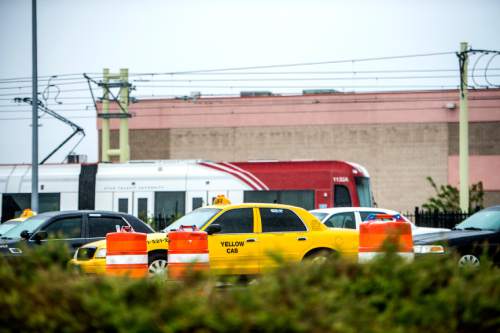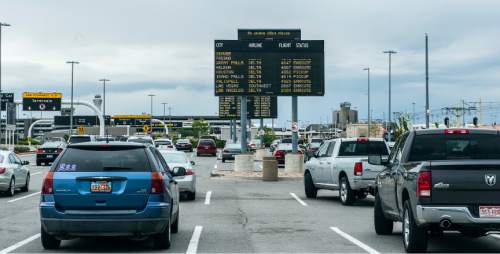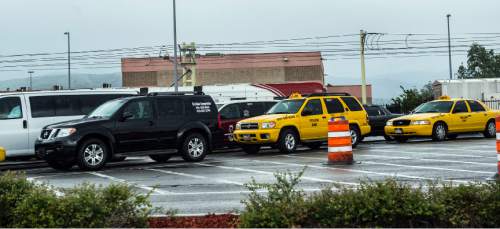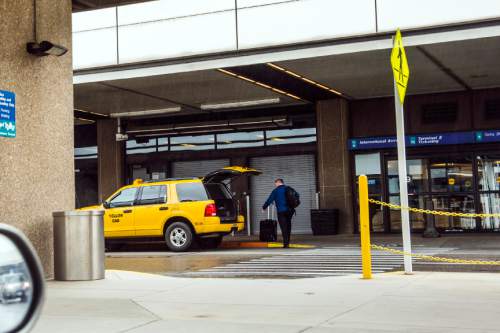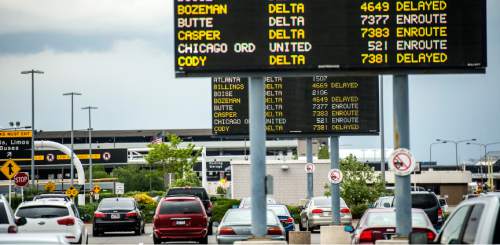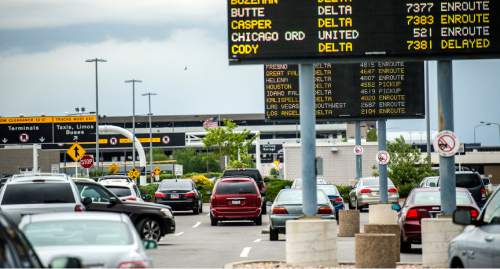This is an archived article that was published on sltrib.com in 2015, and information in the article may be outdated. It is provided only for personal research purposes and may not be reprinted.
Ground transportation is a circus at Salt Lake City International Airport, where ride-hailing companies Uber and Lyft operate unofficially and where some traditional cabdrivers have gone rogue.
Confusion reigns six months after the Salt Lake City Council sought to regulate the new freelance companies but ended up passing an ordinance that deregulated, to a great degree, taxis. Less than two months later, the Utah Legislature compounded the disruption by adding its own law — SB294 — to the mix.
Airport Executive Director Maureen Riley is now urging the City Council to plunge back into the issue. Earlier this week she confirmed independent reports that Uber and Lyft are operating at the airport, although they do so outside the regular cab and limousine area and without electronic tags that count limos and cabs that pay a fee to use the airport.
The unmarked ride-hailing cars at peak hours clog up the noncommercial park-and-wait lot that was established for travelers to get rides from family and friends.
Uber and Lyft could operate legally at the airport, officials say, but they choose not to. That also has been the case throughout Salt Lake City, where Uber and Lyft have refused to follow regulations regarding vehicle inspections and driver-background checks.
Adding to the confusion is that some traditional cabdrivers no longer use the mileage rate agreed upon in a years-old contract with Salt Lake City that is now moot. Visitors and residents alike may not be aware that rates may be high when they grab a cab at the airport curb.
That has led to an increasing chorus of complaints about price gouging, Riley said.
"Our ultimate goal is customer satisfaction," she said in an interview. "For a passenger who doesn't live here, that begins at the airport."
According to city regulations, limousines, taxis and other ground transportation companies must register with the airport to operate there. Among other things, those vehicles must carry an automated vehicle identification (AVI) card that counts each trip a vehicle makes to the airport. The airport charges each cab, limo or van about $1 per trip, although that rate varies depending on the size of the vehicle.
When SB294 becomes law Tuesday, all ground-transportation companies in Utah will be responsible for their own vehicle inspections and background checks. That will be enforced by the state Division of Consumer Protection.
However, SB294 made an exception for the international airport and allowed Salt Lake City to regulate ground transportation there. After the state legislative session, however, the City Council has made no new regulations.
Councilman Kyle LaMalfa concedes that when it comes to ground transportation, "it's like the wild West out there." But he noted that with the coming of Uber and Lyft — which use freelance drivers who operate their own cars through an online booking service — the "world has changed."
Although there have been some reports of gouging, he said, the council is taking a wait-and-see approach.
"We agreed to give it six months — until late August or September — to let the market find a balancing point," LaMalfa said.
The City Council spent months crafting an ordinance that made way for the new-age transportation companies, doing away with 30-minute wait times for limousines and the $30 minimum that applied to them. But the council determined those ride-hailing companies must submit to city background checks of drivers, city vehicle inspections and mandated a $1.5 million liability insurance policy for each driver.
After Uber and Lyft refused to comply and sought redress from the Legislature, the council and Mayor Ralph Becker seemed to accept they couldn't enforce the city's regulations and had, once again, been out-maneuvered on Capitol Hill.
In an interview, however, Becker took umbrage at such an analysis, saying the city would continue efforts to bring reasonable regulation to ground-transportation companies.
And City Council Chairman Luke Garrott, a mayoral candidate, said he wants to do that sooner than later. But the council is up against an annual budget deadline the third week in June, he explained.
One thing is clear, Garrott said: It is important for traditional taxis to continue to operate at the airport.
Enforcing regulations on Uber and Lyft, he added, may continue to be problematic. For now, travelers beware. It's the wild West out there.


